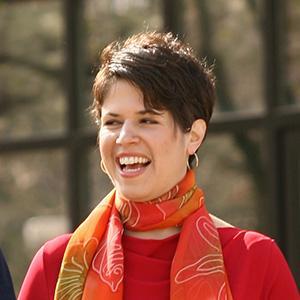
Anna Sampaio on Latina/o Politics and "Coming Home"
Ask Associate Professor and Director of SCU’s Ethnic Studies Program Dr. Anna Sampaio ’92 what she most enjoys teaching, and you’ll get an undeniable answer:
“Hands down, by far, Mexican Immigration to the U.S.!” she says.
For Sampaio, it’s got it all: “A class topic I love to teach, the most relevant and pressing issues of our time even for people who aren’t immigrants, this absolutely affects their daily lives plus, a primary research focus for me.”
She says this enthusiasm, coupled with her academic and personal relationship to the subject matter, is essentially her own response to deep questions about democracy, justice, and quality of life.
“It’s this marriage of professional training and my personal life, of being Latina and from a Latina/o family,” she says. “Race and ethnicity are a truly profound and enduring part of our experience. They’re both personally and intellectually fascinating—and all of this comes together in Latina/o politics.”
Because Sampaio’s work revolves around Latina/o communities and politics in particular, it encompasses political science, political theory, and public law, in addition to ethnic studies and women's and gender studies.
In order to study the political dynamics around voting, Sampaio has surveyed precinct conditions in low-income minority neighborhoods around Presidential elections, completing a pilot survey in San Jose in 2012.
“That year, I worked with approximately 50 ethnic studies and political science students, training them on how to use the specific survey instrument, and then sent them out to gather data on voting accessibility and quality in San Jose.” Students analyzed voting conditions in primarily low income and racial minority precincts, taking into account everything from location convenience and handicap accessibility, to queue wait times and availability of bilingual representatives to assess potential obstacles to voting in those neighborhoods.
And when general elections arrive in fall 2016, Sampaio will likely expand on this research.
“Ideally, I would love to survey every polling location in San Jose,” she says. “Students really like this opportunity. It gives them a different perspective on voting and what affects it—and shows how life circumstances tied to race, ethnicity and income affect voting as well.”
As luck would have it, Sampaio’s career in ethnic studies actually began as a Latina undergrad at SCU studying political science, Spanish, and ethnic studies.
So as a professor, “coming back to Santa Clara was like coming home,” she says. “I wasn’t coming to the campus as an outsider—it was a homecoming.”